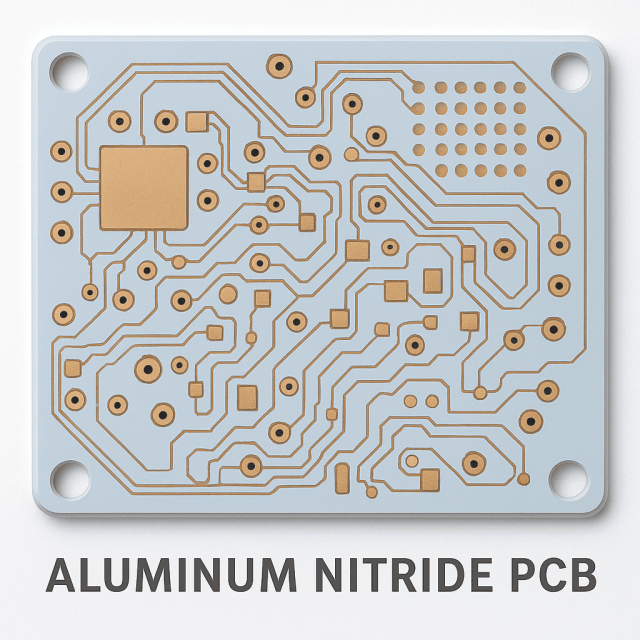Aluminum Nitride (AlN) PCBs are among the highest-performance substrate solutions available today for power electronics, high-temperature devices, RF systems, optoelectronics, and quantum-grade vacuum applications. With exceptional thermal conductivity, extremely low CTE, and outstanding dielectric properties, AlN substrates enable reliable operation in environments that exceed the limits of traditional materials like FR-4, IMS, or even aluminum oxide (Al₂O₃) ceramics.
KKPCB provides advanced AlN PCB fabrication using both thick-film metallization and DPC (Direct Plated Copper) technology, supporting single-layer, multi-layer, metal-based, and hermetic ceramic module designs.
1. Why Aluminum Nitride (AlN) Is a Superior PCB Material
Unmatched Thermal & Electrical Properties
Aluminum Nitride combines several best-in-class performance characteristics that make it the leading substrate for power-dense and temperature-intensive electronic systems.
Key Advantages
-
Ultra-high thermal conductivity: 170–200 W/m·K
Enables rapid heat spreading, ideal for LEDs, laser diodes, GaN/SiC power modules, and RF amplifiers. -
High dielectric strength
Supports high-voltage isolation in compact designs. -
High operating temperature: >350°C
Suitable for extreme environments including aerospace, automotive, power conversion, and vacuum conditions. -
Low CTE (2–4 ppm/°C)
A close match to semiconductor materials (GaN, Si, SiC) → prevents cracking & improves reliability. -
0% water absorption & hermeticity
Enables sealed, moisture-resistant, and vacuum-stable packages. -
Chemically inert and explosion-proof
Resists solvents, plasma, high-temperature oxidation, and corrosive environments. -
Minimal outgassing
Essential for quantum computing systems and aerospace payloads.
These properties allow AlN to achieve superior performance compared to aluminum oxide (Al₂O₃), aluminum-based PCBs, and traditional FR-4.
2. Applications of Aluminum Nitride PCBs

High-Power Optoelectronics
-
UV/IR/visible laser diodes
-
COB LEDs
-
High-power VCSEL arrays
-
Optical transceiver modules
Power Electronics
-
GaN/SiC MOSFET modules
-
DC-DC converters
-
Battery management systems
-
High-current switching modules
RF & Microwave Systems
-
High-power RF amplifiers
-
5G mmWave front-end modules
-
Radar T/R components
Aerospace, Vacuum, and Quantum Systems
-
Space-grade power modules
-
High-vacuum measurement electronics
-
Cryogenic quantum computing boards
Automotive & Industrial
-
High-temperature sensors
-
Inverters & motor drives
-
Solid-state relays
With AlN PCBs, engineers can dramatically increase power density and reliability while reducing total system size.
3. KKPCB Aluminum Nitride PCB Solutions

KKPCB supports two primary AlN PCB technologies:
A. Thick-Film AlN PCB (Silver / Ag-Pd Metallization)
Cost-effective and stable for medium-power applications.
Features
-
Silver or Ag-Pd conductive layers
-
High adhesion on ceramic
-
High temperature tolerance
-
Suitable for sensors, LEDs, heating elements
B. DPC Aluminum Nitride PCB (Direct Plated Copper)
The highest-performance solution for demanding RF and power systems.
Features
-
Copper directly sputtered + electroplated onto AlN
-
Fine-pitch high-density routing
-
Excellent thermal cycling reliability
-
Perfect for GaN/SiC modules, laser diodes, high-power RF
DPC Advantages
-
Strong copper-ceramic bonding
-
Precise ±20 μm line/space
-
Compatible with ENIG, ENEPIG, and soft gold finishes
4. Material Properties of Aluminum Nitride (Typical Values)
Category |
Property |
Unit |
AlN Value |
|---|---|---|---|
| Physical | Color | – | Grey |
| Water absorption | % | 0 | |
| Reflectivity (0.5 mm) | % | ~30 | |
| Electrical | Dielectric Constant (1 MHz) | – | 8–10 |
| Dielectric Loss | ×10⁻⁴ | ~3 | |
| Dielectric Strength | kV/mm | >17 | |
| Volume Resistivity | Ω·cm | >10¹⁴ | |
| Mechanical | Density | g/cm³ | 3.26 |
| Flexural Strength | MPa | ~380 | |
| Hardness | Mohs | 9.3 | |
| Young’s Modulus | GPa | 302 | |
| Surface Roughness | µm | 0.3–0.6 | |
| Thermal | CTE (RT–100°C) | ppm/°C | 2–3 |
| CTE (RT–500°C) | ppm/°C | 2.5–3.5 | |
| Thermal Conductivity | W/m·K | ~170 |
Values shown are typical ranges for commercially available AlN substrates.
5. Why Choose KKPCB for Aluminum Nitride PCB Manufacturing

Advanced Ceramic PCB Processes
-
Thick-film ceramic printing
-
DPC copper deposition
-
Laser structuring and drilling
-
High-precision CNC ceramic cutting
-
Hermetic sealing options
High Reliability Engineering
-
Controlled copper adhesion
-
Low-stress metallization
-
Fine-pitch ceramic routing (≤20 µm)
-
Ultra-flat ceramic machining
Quality & Certification
-
ISO 9001
-
IATF 16949 (automotive)
-
IPC-6012 Class 3 manufacturing standards
Fast Prototyping → Mass Production
KKPCB supports R&D prototyping, pilot runs, and volume production with consistent traceability.

